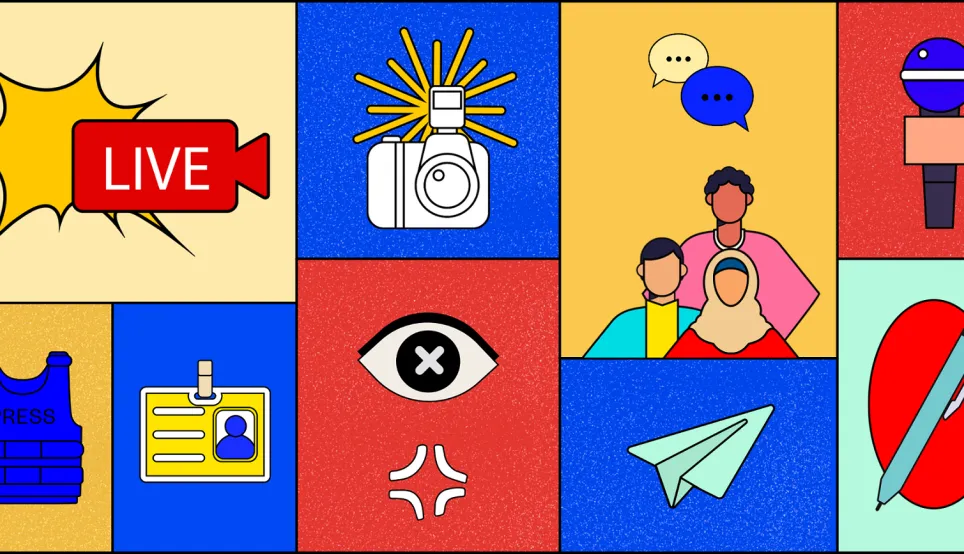If you are passionate about fact checking, changing the victimization of the 'other' in far-flung war zones, the safety of journalists risking it all to spotlight humanitarian crises, and the many ethical considerations involved in war reporting, this media summit is for you.
War Reporting: Navigating the ethical minefield
9:00 - 16:00 ICT, Tuesday 2 August 2022
An online media summit bringing together leading journalists from CCTV, the Guardian, AFP, Reuters, humanitarian and NGO communicators, donors and researchers from across Asia Pacific and working in conflict zones globally.
These experts will (re)consider the ethical challenges and dilemmas that media and humanitarian organizations face when raising the alarm on the world's critical and often forgotten conflicts. This online panel series will set up discussions on these issues, provide an opportunity to connect with speakers, and share in the discussion through Q&A during the sessions.
Interested participants can join the event online via the Zoom platform. Please register for the event by clicking the button below.
Register here
PROGRAM
War Time Realities: Ethical Reporting From Conflict Zones
9:00-10:00 ICT, Tuesday 2 August
Reporting on war and situations of violence, and the communities impacted by these, has always been fraught with challenges. Telling these stories comes with a heavy responsibility. The way we report on conflict is constantly evolving, bringing with it a slew of ethical dilemmas. Three seasoned correspondents reflect on their experiences reporting from war zones, what they've learnt throughout their career, and the ethical hurdles they've faced.
Talking Trauma: The Impact of Reporting on Humanitarian Crises
10:30-11:30 ICT, Tuesday 2 August
As journalists and storytellers reporting on and in violent and distressing contexts, how can we avoid triggering re-traumatisation of victims and survivors? How can we ensure we are not over-exposing ourselves to trauma in our work as journalists, fact checkers and people witnessing the fall out of war in real life and via social media? Our panel of psychologists and experienced journalists bring these questions out of the shadows for a frank discussion.
Media As Aid During Humanitarian Crisis
12:00-13:00 ICT, Tuesday 2 August
In humanitarian crises, information is vital to enable people to make decisions – life changing decisions. What is the role of the media in ensuring that people have access to timely, reliable information in languages they understand? How are humanitarian organizations working to ensure that they are listening and communicating effectively with the people they are supposed to serve? Join experts on the delivery of #InfoAsAid to unpack the challenges and lessons from the field.
Hope: what's it good for?
13:30-14:30 ICT, Tuesday 2 August
In the age of doom scrolling, is there an ethical imperative to reconsider the tendency to focus on misery? For decades now, humanitarian organizations have been criticized for constantly (mis)representing people affected by conflict and crisis in a negative and often stereotypical way. But still this narrative formulation persists. Join journalists and reformed humanitarian communicators who talk about how this can be possible while still presenting the realities.
Fake news: weaponization of mis / disinformation and hate speech
15:00-16:00 ICT, Tuesday 2 August
In conflict settings, 'fake news' can lead to death, injury, imprisonment, discrimination or displacement. It can, directly or indirectly, fuel vicious cycles of violence and further entrench already-protracted conflicts. Misinformation, disinformation and hate speech have become a ubiquitous feature of the 'information' or 'digital' age. We sort fact from fiction and look at how journalists can do the same.
Interested participants can join the event online via the Zoom platform. Please register by clicking the button below.
About the ICRC
The International Committee of the Red Cross (ICRC) is an impartial, neutral and independent organization whose exclusively humanitarian mission is to protect and assist those caught in armed conflict. Established in 1863 and based in Geneva, the ICRC employs some 20,000 people in more than 90 countries. In the Asia Pacific region, the ICRC works in more than 20 countries, providing vital humanitarian assistance for communities affected by ongoing conflict, helping communities and authorities in post-conflict situations.
The ICRC works with journalists all over the world to increase knowledge of the laws of war and how they apply (international humanitarian law), to give analysis of humanitarian contexts and in the worst case provide assistance to journalists who have been caught up in the hostilities.

